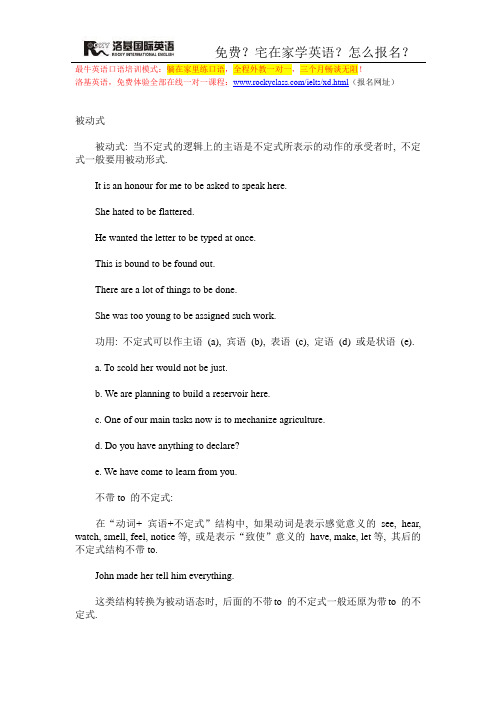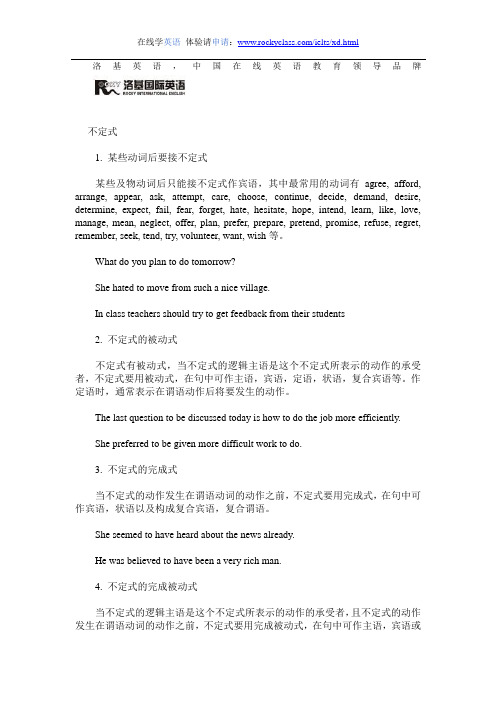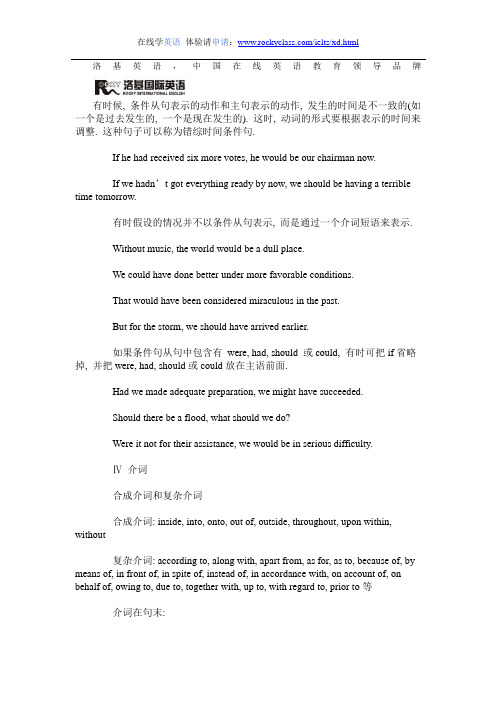2020年12月大学英语四级语法考点
- 格式:doc
- 大小:31.00 KB
- 文档页数:5

最牛英语口语培训模式:躺在家里练口语,全程外教一对一,三个月畅谈无阻!洛基英语,免费体验全部在线一对一课程:/ielts/xd.html(报名网址)被动式被动式: 当不定式的逻辑上的主语是不定式所表示的动作的承受者时, 不定式一般要用被动形式.It is an honour for me to be asked to speak here.She hated to be flattered.He wanted the letter to be typed at once.This is bound to be found out.There are a lot of things to be done.She was too young to be assigned such work.功用: 不定式可以作主语(a), 宾语(b), 表语(c), 定语(d) 或是状语(e).a. To scold her would not be just.b. We are planning to build a reservoir here.c. One of our main tasks now is to mechanize agriculture.d. Do you have anything to declare?e. We have come to learn from you.不带to 的不定式:在“动词+ 宾语+不定式”结构中, 如果动词是表示感觉意义的see, hear, watch, smell, feel, notice等, 或是表示“致使”意义的have, make, let等, 其后的不定式结构不带to.John made her tell him everything.这类结构转换为被动语态时, 后面的不带to 的不定式一般还原为带to 的不定式.She was made to tell him everything.在had better, had best, would rather, would sooner, would just as soon, might (just) as well, cannot but 等搭配之后, 动词不定式也不带to.I’d rather not have eggs and bacon for breakfast.They cannot but accept his term.在make do, make believe, let drop, let fall, let fly, let slip, let drive, let go of, let there be, hear say, hear tell, leave go of等固定搭配中, 用不带to的动词不定式.John let fly a torrent of abuse at me.I’ve heard tell of him.在动词help(或help +宾语)之后可用不带to的不定式, 也可用带to的不定式.Can I help (to) lift this heavy box?在介词except, but 之后, 如果其前有动词do的某种形式, 不定式一般不带to, 反之带to.There is nothing to do except wait till it stops raining.Smith will do anything but work on a farm.There’s no choice but to wait till it stops raining.连词rather than, sooner than 置于句首时, 其后的不定式不带to.Rather than push the book back as he wanted to do, he forced himself to pick it up.出现在句中其他位置时, 其后的不定式有时带to, 有时不带to.He decided to write rather than telephone.The manager believes it is important to invest in new machinery rather than to increase wages.用作补语的动词不定式, 如果主语是由“all + 关系分句”,“thing +关系分句”,“what分句”或“thing +不定式结构”等构成,并带有do的某种形式,这时,作为主语补语的不定式可以省to,也可以不省.What he will do is (to) spoil the whole thing.All you do now is complete the formThe only thing I can do now is go on by myself.The thing to do now is clear up this mess.The least I can do is drive everybody else closer to the issue.“成千上万人疯狂下载。

洛基英语,中国在线英语教育领导品牌不定式1. 某些动词后要接不定式某些及物动词后只能接不定式作宾语,其中最常用的动词有agree, afford, arrange, appear, ask, attempt, care, choose, continue, decide, demand, desire, determine, expect, fail, fear, forget, hate, hesitate, hope, intend, learn, like, love, manage, mean, neglect, offer, plan, prefer, prepare, pretend, promise, refuse, regret, remember, seek, tend, try, volunteer, want, wish等。
What do you plan to do tomorrow?She hated to move from such a nice village.In class teachers should try to get feedback from their students2. 不定式的被动式不定式有被动式,当不定式的逻辑主语是这个不定式所表示的动作的承受者,不定式要用被动式,在句中可作主语,宾语,定语,状语,复合宾语等。
作定语时,通常表示在谓语动作后将要发生的动作。
The last question to be discussed today is how to do the job more efficiently.She preferred to be given more difficult work to do.3. 不定式的完成式当不定式的动作发生在谓语动词的动作之前,不定式要用完成式,在句中可作宾语,状语以及构成复合宾语,复合谓语。
She seemed to have heard about the news already.He was believed to have been a very rich man.4. 不定式的完成被动式当不定式的逻辑主语是这个不定式所表示的动作的承受者,且不定式的动作发生在谓语动词的动作之前,不定式要用完成被动式,在句中可作主语,宾语或构成复合宾语,复合谓语。

2020年12月大学英语四级考试短语复习【篇一】2020年12月大学英语四级考试短语复习carry on 继续展开,坚持下去carry out 实行(到底),展开carry through 实行(到底);贯彻a case in point 一个恰当的例子in case 假如;免得in case of 假如,万一…in any case 无论如何,总之in no case 决不,无论如何不in the case of 就…来说;至于in this case 既然是这样cash in 兑现;收到…的货款cash in on 靠…赚钱,乘机利用cast about for 搜索,寻觅cast aside 消除,抛弃;废除cast back 回想,追溯cast oneself on 委身于,指望catch at 想抓住;渴望取得catch on 理解,明白,变得流行catch up with 赶上;指出…出了差错be caught up in 对…特别感兴趣cave in (使)下陷,坍塌per cent[p2'sent]百分之…be certain of 确信,肯定be certain to do sth 一定做…for certain 肯定地;确凿地make certain (把…)弄确实,弄清楚by chance 偶然,碰巧,意外地take a chance 冒险,投机take one's chance 碰运气,听任命运in charge of 主管,掌管,照管take charge 掌管,负责,看管under the charge of 在…掌管(或看管)之下check in 办理登记手续,报到【篇二】2020年12月大学英语四级考试短语复习cross off 从…划掉,删去cross out 删去,取消cry down 贬低cry for 哭着要;恳求cry off 取消(买卖、契约等)cry out 大声呼喊;大声抱怨cut across 抄近路穿过,对直通过cut back 修剪(树枝等);削减cut down 砍倒;消减;缩短cut in (汽车)超车,抢挡cut into 侵犯(利益等);削减cut off 切掉;切断;阻隔cut out 切掉;删掉;停止cut through (抄近路)穿过;穿透cut up 切碎;齐根割掉in danger 在危险中,垂危out of danger 脱离危险in the dark 在黑暗中;秘密地out of date 过时的,陈旧的to date 到此为止up to date 现代的;直到最近的date back to 追溯到;从…开始有day in day out 日复一日地,天天day after day 日复一日地every other day 每隔一天have one's day 走运;正在得意的时候one day (过去或将来的)某一天the other day 在不久前某天to a day 一天也不差without day 不定期;无限制(休会)a good deal 很多,大量;…得多deal in 经营 deal out 分配,分给deal with 做买卖;处理;安排make a deal with 与…做买卖;和…妥协get into debt 借债,负债in debt to sb. 欠某人的债out of debt 不欠债decide for 作对…有利的决定decide on 选定,决定dedicate to 献(身);把…用在…【篇三】2020年12月大学英语四级考试短语复习bear out 证实,证明bear with 宽容;耐心等待beat off 击退,打退(进攻)beat up and down 来回奔走begin with 以…开始;开始于to begin with 首先,第一on behalf of 代表…,为了…believe in 相信,信仰,主张make believe 假装,装作belong to[bi'l08]属于;附属for the best (完全)出于好意as best one can 尽努力at best 充其量,至多best of all 最(好),首先at one's best 处在状态do one's best 尽力,努力do one's level best 全力以赴get the best of 胜过,打赢had best ,顶好make the best of 充分利用(时间等) for the better 好转,向好的方向发展get the better of 打败,智胜had better do sth. 还是…好,还是…a bill of fare 菜单;节目单bit by bit 一点一点地,逐步do one's bit 尽自己的一份力量every bit 每一点,完全(一样)black and blue (被打得)遍体鳞伤black out 用墨涂掉;封锁(新闻) look black 怒视be to blame 该受责备;应该负责blow out 吹熄(灯火等)blow over 经过;(云等)吹散。

四级语法讲义一:时态:所谓的"时态",就是时间+状态。
谓语动词的时态见下表:1.主动形式2.被动形式CET-4 常考的三种时态:过去完成时;将来完成时;(现在/过去)完成进行时。
时间状语从句当中的时态:一般过去时所有的过去用一般现在时表示现在和将来现在完成时现在完成和将来完成一.非谓语动词一.不定式:一)不定式的常考形式:1)一般形式:He decided to work harder in order to catch up with the others.被动形式: He preferred to be assigned some heavier work to do.语法功能:表示与谓语动词同步发生2)完成形式:He pretended not to have seen me.被动形式:The book is said to have been translated into many languages.语法功能:表示发生在谓语动词之前二)不定式常考的考点:1)不定式做定语----将要发生2)不定式做状语----目的3)不定式充当名词功能---To see is to believe.三)不定式的省略1)感官动词 see, watch, observe, notice, look at, hear, listen to, smell, taste, feel+ do表示动作的完整性,真实性;+ doing表示动作的连续性,进行性I saw him work in the garden yesterday.昨天我看见他在花园里干活了。
(强调"我看见了"这个事实)I saw him working in the garden yesterday.昨天我见他正在花园里干活。
(强调"我见他正干活"这个动作)感官动词后面接形容词而不是副词:The cake tastes good; It feels comfortable.2) 使役动词 have bid make let 等词后不定式要省略但同1)一样被动以后要还原toI ‘d like to have John do it.I have my package weighed.Paul doesn’t have to be mad e to learn.3) help help sb do help sb to do help do help to do四)有些动词后只跟不定式如:want,wish,hope,manage,promise,refuse,pretend,plan, offer,decide,agree,expect allow sb to do, cause sb to do , permit sb to do, enable sb to doforce sb to do. be more likely to do love to do warn sb to do be able to dobe ambitious to do. begin to do . start to do五) 有的时候to后面要接-ing形式accustom (oneself) to; be accustomed to; face up to; in addition to; look forward to; object to; be reduced to; resign oneself to; be resigned to; resort to; sink to; be used to; be alternative to; be close/closeness to; be dedication/dedicated to; be opposition/opposed to; besimilarity/similar to.三、need/want 后的-ing形式具有被动的意思。

2020年12月英语四级阅读理解长难句分析【导语】不做“说话的巨人,行动的矮子”。
说再多的漂亮话,也不如做一件实实在在的漂亮事,行动永远是迈向成功的第一步,想永远只会在原地踏步。
对于考试而言亦是如此,每天进步一点点,基础扎实一点点,通过考试就会更容易一点点。
以下为“2020年12月英语四级阅读理解长难句分析”,欢迎阅读参考!更多相关讯息请关注无忧考网!【篇一】2020年12月英语四级阅读理解长难句分析Boys at single-sex schools were said to bemore likety to get involved in cultural andartistic activities that helped develop theiremotional expressiveness, rather than feelingthey had to conform to the "boy code" ofhiding their emotions to be a "real man".原文译文:据说,在单一性别学校里的男孩更有可能参与到有助于培养他们情感表达能力的文化和艺术活动中,而不会让他们觉得必须遵从“男孩法则”,掩饰自己的真性情从而成为“真正的男人”。
四级词汇讲解:本句的主干是Boys were said to be likely to...that helped develop their emotionalexpressiveness为定语从句修饰cultural and artistic activities; rather than作介词,后接动名词结构feeling...,同时该结构中的they had to conform to the "boy code" of hiding theiremotions to be a "real man"是feeling的宾语从句。

洛基英语,中国在线英语教育领导品牌有时候, 条件从句表示的动作和主句表示的动作, 发生的时间是不一致的(如一个是过去发生的, 一个是现在发生的). 这时, 动词的形式要根据表示的时间来调整. 这种句子可以称为错综时间条件句.If he had received six more votes, he would be our chairman now.If we hadn’t got everything ready by now, we should be having a terrible time tomorrow.有时假设的情况并不以条件从句表示, 而是通过一个介词短语来表示.Without music, the world would be a dull place.We could have done better under more favorable conditions.That would have been considered miraculous in the past.But for the storm, we should have arrived earlier.如果条件句从句中包含有were, had, should 或could, 有时可把if省略掉, 并把were, had, should或could放在主语前面.Had we made adequate preparation, we might have succeeded.Should there be a flood, what should we do?Were it not for their assistance, we would be in serious difficulty.Ⅳ介词合成介词和复杂介词合成介词: inside, into, onto, out of, outside, throughout, upon within, without复杂介词: according to, along with, apart from, as for, as to, because of, by means of, in front of, in spite of, instead of, in accordance with, on account of, on behalf of, owing to, due to, together with, up to, with regard to, prior to等介词在句末:This is what he is interested in.Does everyone has a seat to sit on?名词加介词( n + prep)某些名词之后要求用某些介词: solution to, faith in, glance at, need for某些名词之前要求用某些介词: on one’s guard, at one’s request, in all probability, to my delight动词加介词Vi + prep: prevail on, appeal to, fall into, apply for, touch uponVt + O + prep: lay emphasis on, take advantage of等Vi + adv + prep:I don’t wish to break in on your thoughts.The family came up against fresh problems.You’re not telling me the whole story. You’re holding out on me.She got off with him soon after she began to work at the institution.Vt + O + adv +prep:You shouldn’t take your resentment out on me.We shouldn’t put the shortage down to bad planning.形容词加介词about --- anxious, careful, careless, certain, considerate, enthusiastic, guilty, happy, mad, particular, sad, sure, timid, unhappy, etcat --- awkward, bad, clever, disappointed, disgusted, good, marvellous, quick, skilful, skilled, useless, weak, etcfor --- convenient, eligible, grateful, homesick, hungry, necessary, noted, perfect, responsible, etcfrom --- evident, exempt, inseparable, safe, tired, etcin --- deficient, expert, liberal, quick, rich, successful, weak, etcof --- apprehensive, characteristic, critical, destructive, envious, hard, inconsiderate, impatient, dependent, jealous, positive, scared, sensible, short, sick, suspicious, typical, worthy, etcon --- dependent, keen, intent, etcto --- acceptable, accessible, agreeable, alive, attentive, blind, comparable, courteous, deaf, destructive, essential, favourable, hostile, indifferent, married, obedient, parallel, preferable, related, responsible, sensitive, suitable, unjust, etcwith --- awkward, bored, careful, disappointed, generous, identical, ill, impatient, popular, sick, wrong, etc“成千上万人疯狂下载。
【篇一】2020年12月大学英语四级考试备考短语cross off 从…划掉,删去cross out 删去,取消cry down 贬低cry for 哭着要;恳求cry off 取消(买卖、契约等)cry out 大声呼喊;大声抱怨cut across 抄近路穿过,对直通过cut back 修剪(树枝等);削减cut down 砍倒;消减;缩短cut in (汽车)超车,抢挡cut into 侵犯(利益等);削减cut off 切掉;切断;阻隔cut out 切掉;删掉;停止cut through (抄近路)穿过;穿透cut up 切碎;齐根割掉in danger 在危险中,垂危out of danger 脱离危险in the dark 在黑暗中;秘密地out of date 过时的,陈旧的to date 到此为止up to date 现代的;直到最近的date back to 追溯到;从…开始有day in day out 日复一日地,天天day after day 日复一日地every other day 每隔一天have one's day 走运;正在得意的时候one day (过去或将来的)某一天the other day 在不久前某天to a day 一天也不差without day 不定期;无限制(休会)a good deal 许多,大量;…得多deal in 经营 deal out 分配,分给deal with 做买卖;处理;安排make a deal with 与…做买卖;和…妥协get into debt 借债,负债in debt to sb. 欠某人的债out of debt 不欠债decide for 作对…有利的决定decide on 选定,决定dedicate to 献(身);把…用在…【篇二】2020年12月大学英语四级考试备考短语burn out 烧坏;烧尽,筋疲力尽burn up (炉火等)烧旺起来burst into laughter 突然笑起来burst out laughing 突然笑起来on business 因事,因公mean business 是当真的be busy with 忙于…but for 倘没有,要不是button up 扣,扣紧钮扣buy off 收买buzz off (俚)急忙离去by and by 不久以后,将来by and large 总的来说,大体上by oneself 单独;独自,自行by far …得多;最最call after 追在…的后面叫喊call back 叫回来,收回(错话等) call for 要求,需要,提倡call forth 唤起,引起call in 收回(某物)call off 叫走,叫开;取消call on 访问;号召;呼吁call up 征召(服役),动员cannot but 不得不,不会不cannot help 不得不;忍不住cannot help but 不得不(接动词原形) cannot...too... 越…越好be capable of 有做出(某事)倾向的care for 关怀,照管;愿意take care 当心,注意take care of 爱护,照顾,照料carry back 运回;使回想起carry off 拿走,夺去…的生命【篇三】2020年12月大学英语四级考试备考短语for example 例如except for 除…之外go to excess 走极端in excess of 超过in exchange for 交换exert oneself to 努力,尽力expect of 对…期望(要求)at the expense of 归…付费go to the expense of 为…的目的花钱find expression in 在…中表现出来give expression to 表达出,反映to some extent 在某种程度上catch sb.'s eye 引起(某人)注目clap eyes on 看见;注视keep an eye on 照看;留意keep one's eyes open 留心看着;保持警惕run one's eyes over 扫视,浏览see eye to eye 看法完全一致face to face 面对面(的)地;对立地face up to 勇敢地对付;大胆面向in face of 面对;纵然,即使make a face (表示厌恶等)做鬼脸as a matter of fact 事实上,其实in fact 其实,实际上in point of 实际上,就事实而论fail in 在…不足,疏忽fail to 不能,记忆without fail 必定,务必in faith 确实,的确keep faith 守信,忠于信仰break faith 背信,背弃信仰fall back on 求助于,转而依靠fall behind 落在…后面,跟不上fall for 爱上,迷恋;受骗fall in love 爱上某人fall in with 偶尔遇到;同意,赞许fall into 落入;陷于;河流注入fall out 争吵;闹翻;结果fall out of 放弃(习惯等)fall through 失败,成为泡影fall to 着手;开始攻击fall under 受到(影响等);被列为a far cry 遥远的距离as far as …那么远,直到;至于far and away 大大…;无疑地。
【导语】不管你的梦想是什么,做好当前的事情,终将会如愿以偿。
对于考试⽽⾔,同样需要不断地积累,坚持学习。
以下为“2020年12⽉英语四级⾼频词汇”,欢迎阅读参考!更多相关讯息请关注⽆忧考!【篇⼀】2020年12⽉英语四级⾼频词汇 in place 在合适的位置 in practice 在实践中,实际上 in proportion to 与……成⽐例 in public 公开地,当众 in quantity ⼤量 in question 正在谈论的 in regard to 关于,⾄于 in relation to 关于,涉及 in return for 作为对……报答 in return 作为报答/回报/交换 in short 简⾔之,总之 in sight 被见到;在望 in spite of 尽管 in step with 与……⼀致/协调 in tears 流着泪,在哭着 in terms of in the company / wake of随着 in the course of 在……期间/过程中 in the distance 在远处 in the end 最后,终于 in the event of 如果……发⽣,万⼀ in the face of 即使;在……⾯前 in the first place ⾸先 in the future 在未来 in the heat of the day ⼀天中最热的时候【篇⼆】2020年12⽉英语四级⾼频词汇 drop by / in 顺路拜访 due to 由于,因为 each other 互相 easier said than done 说起来容易做起来难 east of 在……东⾯ equal to 相等,胜任 equivalent to 等于,相当于 essential to/for 必不可少 even if/though 即使,虽然 ever so ⾮常,极其 every now and then 时⽽,偶尔 every other 每隔⼀个的 except for 除了……外 expert at/in/on 善于 face to face ⾯对⾯地 faculty members 教职员⼯ faithful to 忠实于 fall flat 平躺在地上 familiar to sb 为……所熟悉 familiar with sth 熟悉,通晓 far from 远⾮,远离 fatal to 致命的 favorable to ⽀持,赞成 fearful of 惧怕 feel at home 熟悉【篇三】2020年12⽉英语四级⾼频词汇 feel blue ⼼情不好 feel free to 随便 figure out sth解决 fit for 适于 flat tire 轮胎没⽓ flat tire 轮胎没⽓ fond of 喜欢 for ever 永远 for good 永久地 for the better 好转 for the moment 暂时,⽬前 for the present 暂时,⽬前 for the sake of 为了,为了……的利益 for the time being 暂时,眼下 foreign to ⾮……所原有 free of /from 未受……;免费 free with 康慨,⼤⽅ from time to time 有时,不时 full up 客满 get a bargain 买到便宜货 get nowhere with 毫⽆进展 get over 恢复 get used to 习惯于 give off 发出 give someone a big hand 为某⼈⿎掌 。
四级语法考点总结语法是学习一门外语时必不可少的一部分,对于英语学习者来说,掌握语法规则和考点是提高语言能力的关键。
以下是四级考试常见的语法考点总结。
一、时态与语态1. 一般现在时:表示经常或习惯性的动作,句子结构为主语+谓语动词原形。
2. 现在进行时:表示现阶段正在进行的动作,句子结构为主语+be 动词+动词-ing形式。
3. 一般过去时:表示过去发生的动作或状态,句子结构为主语+谓语动词过去式。
4. 过去进行时:表示过去某个时间点正在进行的动作,句子结构为主语+was/were+动词-ing形式。
5. 一般将来时:表示将来要发生的动作,句子结构为主语+will+动词原形。
6. 现在完成时:表示过去发生的动作对现在造成的影响或结果,句子结构为主语+have/has+动词过去分词。
7. 被动语态:表示句子的主语是动作的承受者,句子结构为主语+be动词+过去分词。
二、名词与代词1. 可数名词与不可数名词:可数名词表示可以数的事物,可以与冠词或数词连用;不可数名词表示不能数的物质或抽象概念,不能与冠词连用。
2. 可数名词的单复数形式:大部分名词在尾部加-s或-es构成复数形式,但也有很多名词有不规则的复数形式。
3. 代词的使用:代词用于代替名词,可以避免重复使用,例如人称代词、指示代词、不定代词等。
4. 反身代词:反身代词用于强调动作的主体同时也是动作的承受者,例如myself、yourself等。
三、形容词与副词1. 形容词的比较级与最高级:形容词比较级用于比较两个事物的性质,最高级用于比较三个或以上事物的性质。
2. 副词的用法:副词用于修饰动词、形容词或其他副词,例如slowly、very等。
四、介词与连词1. 常用介词的使用:介词用于表示时间、地点、原因、方式等,例如at、in、on等。
2. 连词的使用:连词用于连接短语、从句或并列句,例如and、but 等。
五、从句与句型1. 名词性从句:名词性从句用于替代名词的作用,包括主语从句、宾语从句、表语从句和同位语从句。
2020年12月大学英语四级考试真题(二)答案与详解Part I Writing结构框图:------------------------------r-c: ,第1段引出话题并提出观点:近几十年来,中国的交通方式发生了巨变,给:I I我们的生活带来了巨大影响。
,、---------------------------------------------------------·'----------------------------------------------------------The Changes in the Wa y : !: 第2段具体描述交通方式的变化带来的影响:缩短了距离,提高了效率,带:of Transportation l --r-C• 来了方便。
该段使用例证法,以不同交通工具为例,分别对应段首提到的:1 I三种影响。
,、--------------------------------------------------------------------------------------------------------------------'--C•: 1第3段总结全文并深化主题:交通方式的改变背后是科技工作者的努力,我:;们应该感谢他们。
----------------------------------------------------------范文点评:参考范文精彩点评The Changes in the Way of Transportation[ 1) China has wi血蕊d dramatic changes i n t h e way o f I【1)引出话题近几十年来中国的交通transportation in the recent decades, which range from theconstantly increasing number of private cars to the rapidly growing convenience of public transportation. (2】And these changes havedefinitely had a great impact on our life.【3)Apparently, the advance of transportation"shortens" thedistance, Improves our effi ciency and leads to great conveni en�in our【4)使用For example引出例证一:多样life. 【4)For example, a wide range of means of public 化的公共交通方式,如火车和飞机,transportation, such as the rail and airplane, make it possible for us 帮助我们实现了说走就走的旅行to take a trip wherever and whenever we like. [�) A private� 愿望.can save us much time and trouble in waiting for crowded buses, 【5)阐述例证二:以私家车为例,说明私especially when we are in a hurry. However, what impresses me 人交通方式减少了等待时间和麻烦。
2020年12月大学英语四级语法考点【导语】你可以创造未来的方式,就是脚踏实地向前走。
你的未来也只有自己才能创造,既然选择了就要毫不犹豫的坚持走下去。
以下为“2020年12月大学英语四级语法考点”,欢迎阅读参考!更多相关讯息请关注无忧考网!【篇一】2020年12月大学英语四级语法考点ago与before的用法区别1)两者均可表示在多久时间“以前”(要放在表示一段时间的词语之后),但有区别:ago 从现在向前回溯,即现在的过去,因此通常与一般过去时连用;而before则从过去向前回溯,即指过去的过去,因此通常与过去完成时连用(尤其用于宾语从句中)。
如:I bought the computer two years ago. 我是两年前买这台电脑的。
He said they had left five days before. 他说他们5 天前就离开了。
注:在表示推测或为使语境生动的句子中,有时也可用ago代替before.如:He must have left a week ago. 想必他在一星期前就离开了。
I had thought that he had died at least 20 years ago. 我原以为他至少在20 年前就已经去世了。
(2)before 有时单独使用(即不连用具体时间),泛指一般意义的“以前”,此时可用于一般过去时,也可用于现在完成时。
如:He didn‘t know that before. 他以前不知道此事。
I have been there before. 我以前去过那儿。
【篇二】2020年12月大学英语四级语法考点much可修饰哪些词语一、much修饰比较级修饰比较是副词much的常见用法,“much + 比较级”的意思是“更……”“……得多”。
如:It‘s much colder today than it was yesterday. 今天比昨天冷得多。
It was much worse than I thought. 它比我想像的还要糟得多。
We will be a much better football team next year. 明年我们将会成为一支更好的足球队。
二、much修饰级much修饰级应置于级前的定冠词之前,而不是之后。
“much + the + 级”的意思是“最最……”“绝对是最……”。
如:This is much the most difficult. 这是最最难的。
That‘s much the best plan. 那绝对是的计划。
Of the three boys Nick is much the cleverest. 这三个男孩中,尼克最最聪明。
三、much修饰形容词的原级much修饰形容词原级的情形主要见于那些由过去分词转化来的形容词。
如:I was much annoyed. 我很不高兴。
She wasn‘t much surprised. 她并不太惊讶。
注:有个别非分词转化来的形容词有时也可用much修饰,但这种用法很有限,通常只见于good,different等少数几个形容词。
如:I don‘t think this battery is much good. 我并不认为这种电池非常好。
The new school is n‘t much different from the old one. 新学校与老学校区别不太大。
四、much修饰副词toomuch too 为习语,其中的much修饰副词too;much too可视为too的加强说法,其语气比单独用too更强。
如:He spoke much too fast. 他说话说得太快了。
This is much too heavy for you to lift. 这东西太重,你拿不起来。
注意:much too与too much词序不同,用法也不同。
从句法功能上看,much too的用法与too相同,但比too的语气更强;而too much在用法上则与much相同,但比much 语气更强。
比较:He drives much too fast. 他开车开得太快了。
The shoes are much too small for me. 这鞋子我穿太小了。
There is too much rain. 雨水太多了。
You have given me too much. 你已经给我太多了。
五、much修饰介词短语much主要用于修饰由like,in,to等少数介词所构成的介词短语。
如:The baby doesn‘t look much like you. 这婴儿长得不大像你。
They‘re very much in love with each other. 他们彼此在热恋中。
Much to my surprise, she did it by herself. 让我极为惊讶的是,这竟然是她自己做的。
六、much修饰动词much修饰动词时,通常只用于否定句或疑问句中,一般不能用于肯定句中(除非前面有very,too,so等之类的修饰语)。
如:正:She doesn‘t like him much. (用于否定句,故正确)正:She doesn‘t much like him. (用于否定句,故正确)正:Does she like him much?(用于疑问句,故正确)正:Does she much like him? (用于疑问句,故正确)正:She likes him very [too, so] much. (其前有修饰语,故正确)注意以下误句:误:She likes him much. / She much likes him. (因为它用于肯定句,且其前没有修饰语,故不正确)但是,不带修饰语的much有时也能在肯定句中修饰动词,但这通常只限于admire,affect,appreciate,dislike,enjoy,look forward to,prefer,regret等少数动词,且much通常只能放在句中,不放在句末。
如:We much appreciate your invitation. 我们非常感激你的邀请。
We would much prefer to be given money. 我们还是更喜欢有人给我们钱。
These factors have much affected the building of nuclear plants. 这些因素极大地影响了核电站的建立。
七、much修饰asmuch as 可视为习语,其意为“虽然”,用法与though相似。
如:Muc h as I‘d like to help, there isn't a lot I can do. 尽管我愿意帮忙,却没有很多事我能做。
Much as he admired her looks and her manners, he had no wish to marry her. 虽说他很欣赏她的外貌和仪态,他却无心和她结婚。
八、much修饰the samemuch 修饰the same,从表面上是加强了the same的语气,但实际上是缓和了其语气,其意为“情况大致相同”“几乎差不多”“没什么变化”。
如:The patient is much the same this morning. 今天早上病人情况几乎没什么变化。
Whichever method you use, the result is much the same. 不论你用哪一种方法,结果都差不多。
They eat much the same thing for breakfast every day. 他们每天吃的早餐几乎都一样。
【篇三】2020年12月大学英语四级语法考点deep与deeply副词的区别有的与形容词同形的副词与以-ly结尾的副词意义差别不是很大。
我们可从以下几个方面来区分:位置不同:在动词之前或句首通常只用ly副词。
如:He slowly drove the car into the garage.他把车慢慢地开进车库。
Quickly everybody stood up.大家很快地站起来。
但在动词后,两种副词都可用。
如:He drives slow/slowly.他的车开得很慢。
He sold it cheap/cheaply.他将它便宜卖了。
含义不同:与形容词同形的副词通常指具体情况,而-ly副词多指抽象概念。
请比较:He is sitting close to me.他就坐在我边上。
Watch closely what I do.仔细瞧我怎么做的。
I went deep into the woods.我深入到树林中。
Her story moved me deeply.她的故事使我深受感动。
The plane was flying high.这架飞机飞得很高。
He think highly of your work.他对你的工作评价很高。
He opened the door wide. 他把门开得大大的。
English is widely used in the world.英语在世界范围内广泛使用。
习惯搭配不同:如:1.在stand firm(站稳)和hold firm(固守)中不用firmly.2.在fair and square(正大光明地)和play fair(公平办事)中不用fairly.3.在take it easy(别着急),go easy(从容不迫),easier said than done(说来容易做来难),easy come,easy go(易得则易失)等中不用easily.4.在sound asleep(熟睡),wide open(完全开着),wide awake(完全醒了)中不用soundly 或widely.。